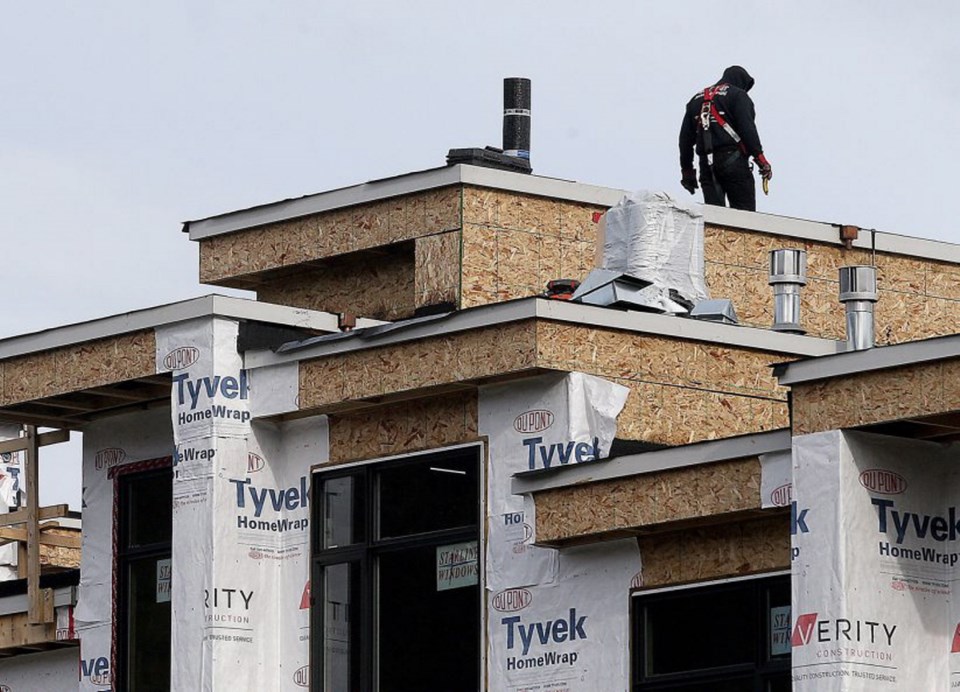 Back in 1990, on their first real date, Ash and Monique Knightley spent the day clearing trees that had fallen across the fence of his Metchosin acreage.
Back in 1990, on their first real date, Ash and Monique Knightley spent the day clearing trees that had fallen across the fence of his Metchosin acreage.
“I gave her some old coveralls and combat boots to wear,” Ash says.
That pretty much set the tone for their marriage. The Knightleys are hale and hearty types. They got where they are by working hard — buying buildings and renovating them themselves, just like on those HGTV shows. They are rarely seen without smiles on their faces and drywall dust in their hair.
They now own and manage a six-plex in Rockland and, with Monique’s parents, an Esquimalt building containing 19 apartments and six small retail spaces. Ash and his father-in-law did much of the renos on both properties, with the Knightleys’ two boys providing the grunt labour. Monique does the design, purchasing and the books. They do their own maintenance. “It’s very much a family business,” Ash says. “Both my boys learned valuable trade skills working on our properties and it provided them with summer employment.”
Here’s what else he says: If government is serious about increasing the rental-housing supply, it needs to give people like him a reason to invest in such projects. Instead, it’s driving them out. “Current government policies are in fact driving investors away from the rental business and things are getting worse.”
It wasn’t always like that. Back in the 1970s — which, not coincidentally, is when much of Victoria’s rental stock sprouted — the federal government offered tax credits to those investing in multi-unit residential buildings. At the same time, Canada Mortgage and Housing Corp. offered grants to provide developers with a bit of cash flow until their buildings generated income.
No longer. The incentives have disappeared. Instead, government offers reasons to take money elsewhere.
Take the income taxes: Because the Knightleys have a real estate operation with fewer than five fulltime employees, it is deemed a “passive” investment. That means their income is taxed at the highest rate — 50.7 per cent — far above that paid by larger property management companies and most other small business owners. They are also not eligible for some capital gains deductions that are meant to spur small-business growth.
Given those disadvantages, why would mom-and-pop entrepreneurs go into the rental business instead of, say, investing in a retail store? Or why not just stick their money in GICs, or bonds, or somewhere else that doesn’t involve collecting rent or replacing carpets.
Banks aren’t big fans of lending money to build rental projects. It takes too long to earn back the whack of cash that goes out up front. CMHC provides discounted financing for residential projects, but the savings are offset by hefty brokers’ commissions (Ash cites $70,000 to $100,000 for a 19-unit building). Other rules discourage CMHC involvement in mixed-use — that is, commercial and residential — buildings.
Then there are the fees. Municipal governments might talk a big game about affordable housing, but they still saddle builders and landlords with costs that inevitably get passed on to renters and buyers (and let’s not forget the burden added by the provincial government, which does quite nicely on real estate transactions, pulling in more than $2 billion annually from the property transfer tax — more than it gets from mining, forestry and natural gas production combined). In an April op-ed in the Times Colonist, Victoria developer Ken Mariash referred to studies that said municipal approvals add $85,000 to the cost of building a unit. In May, the C.D. Howe Institute said that between 2007 and 2016, development charges and regulatory barriers added $264,000 to the cost of a Victoria-area single-family home.
Ash cites a water bill for the Rockland six-plex that charged more in fees — including the City of Victoria’s notorious rainwater tax — than it did for water consumption. A Landlord B.C. survey found building maintenance costs rose 7.6 per cent in the past year. Meanwhile, rent increases for 2019 are capped at 2.5. Fine, but where, then, is the incentive for investors and property managers to stay in the rental game?
“Governments need to understand that developers can build condos, commercial projects or purpose-built rentals for the same building cost,” Ash says. There’s no way we’ll see mass construction of residential rentals without incentives that make building and managing them a worthwhile option. They must also be profitable enough to make lenders comfortable putting up the capital. And remember that not all developers are Vancouver gazillionaires using $50 bills to light $100 cigars, that the mom-and-pops need to be taxed like other small businesses.
“If they really want change,” Ash says, “they need to make it financially viable for business to operate.”



